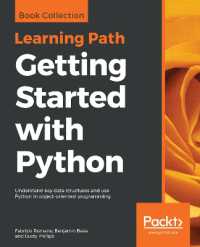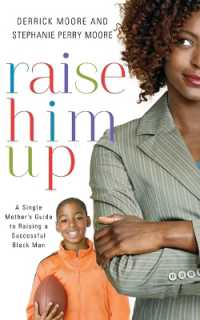- ホーム
- > 洋書
- > 英文書
- > History / World
Full Description
Can anything new be said about the Declaration of Arbroath? This volume says there can.In 1977 Grant Simpson published a seminal article in the Scottish Historical Review: which asked if 'anything conceivably new can be said about a document so well known in Scotland as the Declaration of Arbroath?' The contributors to this volume demonstrate that there can. The text of the Declaration, written in 1320, followed closely an Irish prototype and was structured in the fashion that was expected at the papal court, where the letter was sent. It drew heavily on political ideologies and legal concepts with which English and continental intellectuals were familiar. And it was brought to papal attention through diplomatic means and practices which were commonly understood across Europe. Although the Declaration disappeared from political discourse in the centuries which immediately followed its dispatch, its rediscovery from the later seventeenth century is traced in hitherto unprecedented depth. Its relevance was not just to Scotland. The question of whether it influenced the American Declaration of Independence has oft been mooted but is here closely investigated. Today the Declaration remains a controversial document, inspirational to many, misappropriated by others, and even feared by some.Sharper focus on context; new textual analysis; unsurpassed investigation of the afterlife of the declaration in the seventeenth, eighteenth and nineteenth centuries.
Contents
Introduction, Terry Brotherstone and David Ditchburn; A Longing for Peace: Putting The Declaration of Arbroath in Context, Fiona Watson; Without or Against the King: Communities as Actors of Diplomacy from the Thirteenth to the Fifteenth Century, Stephane Péquignot; The Remonstrance of the Irish Princes: Prototype for the Declaration of Arbroath?, Seán Duffy; Temporary King, Sempiternal Kingdom: The English Barons' Letter of 1301 and the Declaration of Arbroath, Scott Dempsey; Robert I, The Newbattle Council and the Networks of Power, Matthew Hammond; Enduring Ideas: Kingship, Community and the 'Representative Claim' in Later Medieval Scotland, Lynn Kilgallon; Contractual Monarchy, Popular Sovereignty and National Opinion in Scotland on the Eve of the Union, Karin Bowie; The Declaration of Arbroath and Scotland's Failed Radical War, Michael Penman; 1320, 1776 and All That: A Tale of Two 'Declarations', David Armitage; After Word — The Declaration Today, Neal Ascherson.








